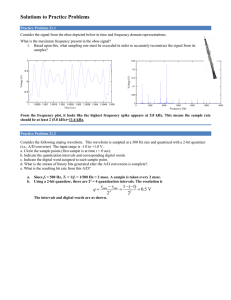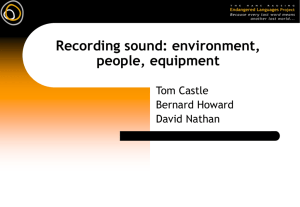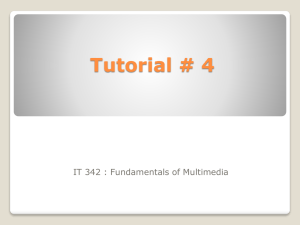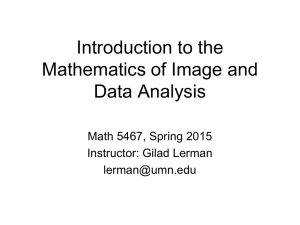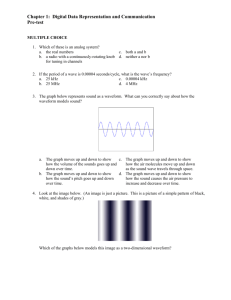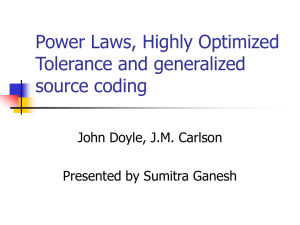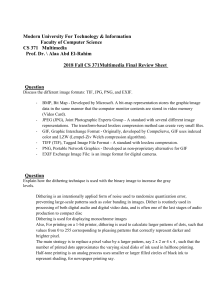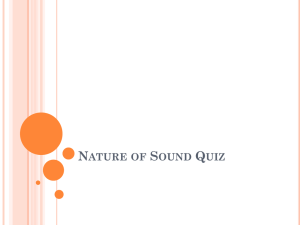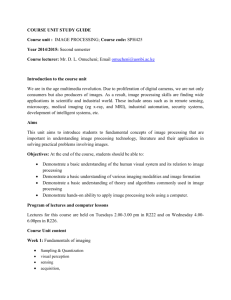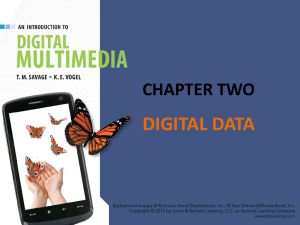Multimedia Technologies Question Bank: Numericals & Theory
advertisement
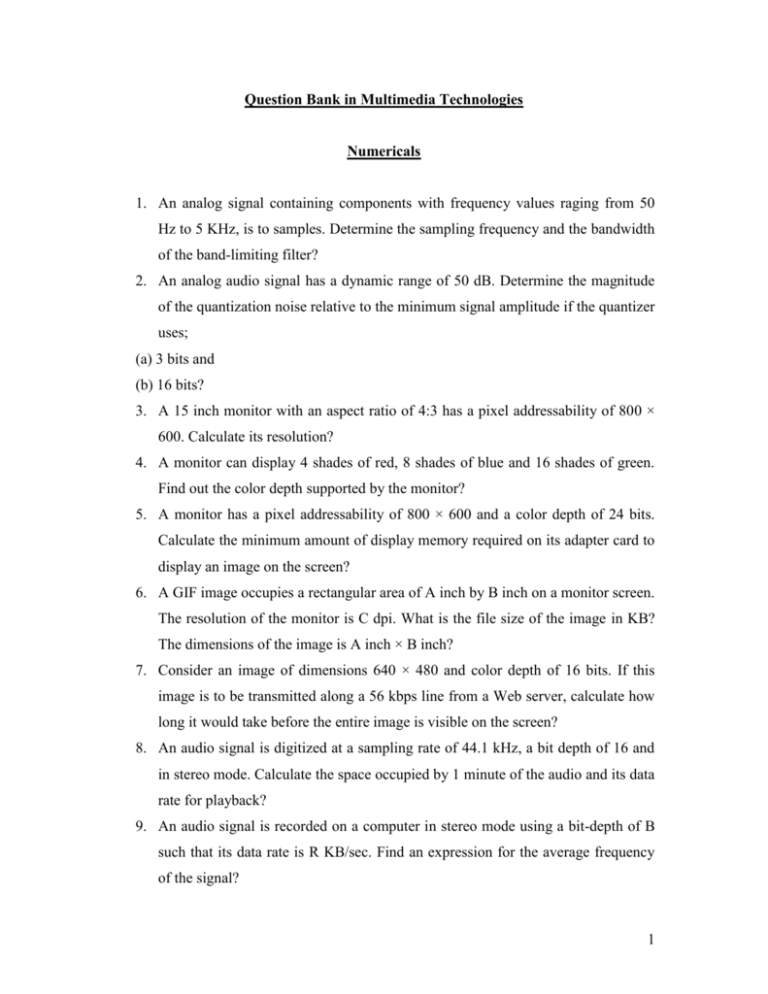
Question Bank in Multimedia Technologies
Numericals
1. An analog signal containing components with frequency values raging from 50
Hz to 5 KHz, is to samples. Determine the sampling frequency and the bandwidth
of the band-limiting filter?
2. An analog audio signal has a dynamic range of 50 dB. Determine the magnitude
of the quantization noise relative to the minimum signal amplitude if the quantizer
uses;
(a) 3 bits and
(b) 16 bits?
3. A 15 inch monitor with an aspect ratio of 4:3 has a pixel addressability of 800 ×
600. Calculate its resolution?
4. A monitor can display 4 shades of red, 8 shades of blue and 16 shades of green.
Find out the color depth supported by the monitor?
5. A monitor has a pixel addressability of 800 × 600 and a color depth of 24 bits.
Calculate the minimum amount of display memory required on its adapter card to
display an image on the screen?
6. A GIF image occupies a rectangular area of A inch by B inch on a monitor screen.
The resolution of the monitor is C dpi. What is the file size of the image in KB?
The dimensions of the image is A inch × B inch?
7. Consider an image of dimensions 640 × 480 and color depth of 16 bits. If this
image is to be transmitted along a 56 kbps line from a Web server, calculate how
long it would take before the entire image is visible on the screen?
8. An audio signal is digitized at a sampling rate of 44.1 kHz, a bit depth of 16 and
in stereo mode. Calculate the space occupied by 1 minute of the audio and its data
rate for playback?
9. An audio signal is recorded on a computer in stereo mode using a bit-depth of B
such that its data rate is R KB/sec. Find an expression for the average frequency
of the signal?
1
10. An audio clip has a duration of 8 minutes. The highest frequency in the soud wave
is 15 kHz. This is to be sampled using 8 bits per sample and in stereo mode.
Calculate the file size. Mention any assumptions made?
11. Consider a TV camera where the maximum intensity of a color signal is
represented by 1 volt. An unsaturated magneta signal is formed by mixing 70% R,
20% G and 60% B. What is the luminance output voltage for the signal? What
would this value be if the magenta color is saturated?
12. An NTSC encoded video clip has a frame size 720 × 480 pixels and is digitized
using a bit-depth of 8 bits for each of Y, Cb and Cr and a chroma sub-sampling
scheme of 4:2:2. Calculate the file size of 1minute of the video clip and the total
time taken for it to be transmitted over a 2 Mbps transmission line?
13. An MPEG-1 video has a frame sequence : IBBPBBPBBPBBI. Determine the size
of GOP. Derive the transmission sequence of the frames?
14. A digitized video is to be compressed using the MPEG-1 standard. Assuming a
frame sequence of IBBPBBPBBPBBI… and average compression ratios of10:1
(I), 20:1 (P) and 50:1 (B) derive average bit rate generated by the encoder for both
the NTSC and PAL formats?
15. What do you mean by entropy of information? Find the entropy of string
“bbbbbb” where the probability of ‘b’ is = 1/16?
16. A CD-ROM contains 333000 block to be played back in 74 minutes. Calculate the
data rate and capacity of the CD-ROM when operating in (a) Mode 1 (b) Mode 2
333000 blocks are played back in 74 minutes?
17. Calculate the file size for 1 minute, 44.1 KHz, 16-bits, stereo sound file?
18. Calculate the file size in bytes for a 10 second recordingat 20.05 KHz, 8-bit
resolution monophonic sound?
19. Give the alphabet {a,b} with P (a) = ¼, P (b) = ¾, Code the sequence abc?
20. What is the principle of Arithmatic code? Generate the tag interval for alphabet A
= {a1, a2, a3} with P(a1) = 0.7, P(a2) = 0.1 and P(a3) = 0.2?
21. A document contains letters A through F with frequencies as indicated:
A : 0.25, B : 0.1, C : 0.2, D : 0.15, E : 0.26, F : 0.04
2
Theoretical
22. What are the various hardware platform available for multimedia?
23. On what criteria you would emphasize while selecting a multimedia computer
system?
24. Explain Card and Page based Authoring tools with Examples?
25. How CD is different from DVD. Discuss about recent development in RAM
technologies?
26. What is optical disc? How it is different from magnetic optical disk?
27. Differentiate between the STP and UTP cables with their advantages and
disadvantages?
28. Differentiate between the BMP, JPG, GIF and TIFF image file formats
mentioning where each is used?
29. ‘The colors of an image may appear different on two different monitors’. Explain
whether true or false?
30. Explain how a time domain signal is converted to frequency domain by Forward
DCT?
31. What is a basis function? Explain the nature of the sine and cosine basis functions
in DFT?
32. What is dynamic range and how does it influence the number of bits to be used
for the quantizer?
33. What is meant by the ‘vertical scan rate’ of a monitor? How is it related to the
‘horizontal scan rate’?
34. Explain Frame Replenishment and Motion Compensation for video compression?
35. What are the main functions of the video adapter card? How is the card connected
to the monitor?
36. What determines the total number of colors that can be displayed on a monitor
and how?
37. What is RIAA equalization curve?
3
38. Explain the main aspects of the MIDI specifications?
39. Explain how compression is achieved in the MP3 format using relevant block
diagrams?
40. Write a note on Quick Time? How Quick Time is de-factor standard for video?
41. What are the various modes of JPEG encoding schemes? Explain JPEG image
compression standard?
42. Explain what is a Macroblock and GOP in MPEG-1 video compression scheme?
43. Explain the significance of the quantization step in JPEG compression scheme?
44. Explain following terms associated with digital sound:
(i) Sample rate
(ii) Sample size
(iii) Bit Resolution
(iv) Quantization
(v) Clipping
(vi) Noise
45. How is lossy achieved using the GIF standard. Is it a lossy or loss-less?
46. Explain digital audio file formats? Explain.
47. Discuss the use of text in multimedia. Explain the term hypermedia and
Hypertext?
48. What is sampling? Explain the sampling variable.
(a) Discuss the detail about the characteristics of various image formats.
(b) Explain the Shannon Fano and Huffman algorithm and also determine the
Huffman and Shannon Fano code for following variables whose
frequecies given below:
A
B
C
D
E
F
G
20
30
50
35
70
10
05
49. What is dictionary based compression? Show all the steps of LZW compression
including
dictionary
formation
for
the
text
string
“AB$ABA$ABA$ABAAC$AB”
50. What are sockets? How can I detect that the other end of a TCP connection has
created?
51. Can TCP keep alive timeouts be configured? Are there object-oriented network
programming tools?
4
52. Explain the Update procedure for encoding the message [aardvark], where our
alphabet consists of 26 lower letters of English alphabets. Give Flowchart of the
procedure.
53. Write a short note on Silence compression/
54. What is the role of Multiple monitors in image processing?
5
